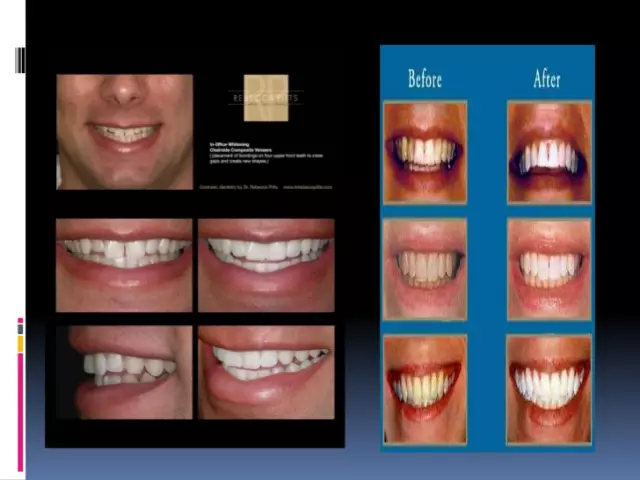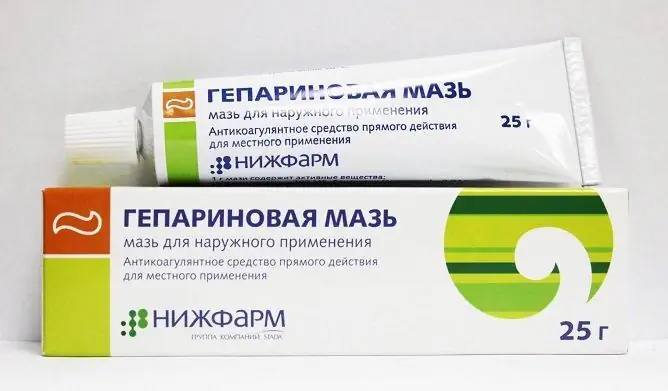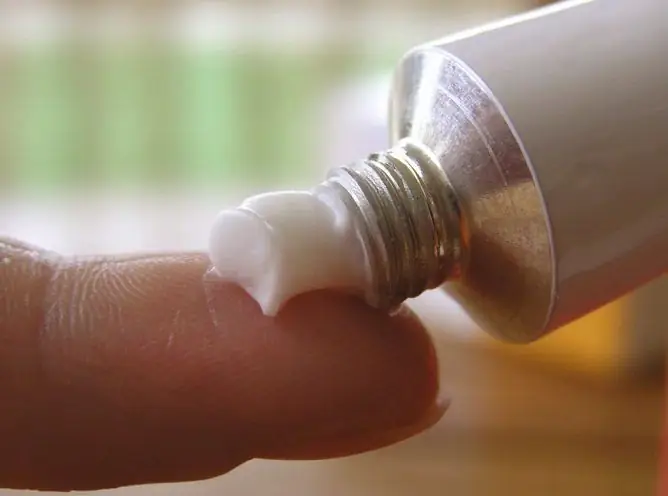- Author Rachel Wainwright wainwright@abchealthonline.com.
- Public 2023-12-15 07:39.
- Last modified 2025-11-02 20:14.
Belogent
Belogent: instructions for use and reviews
- 1. Release form and composition
- 2. Pharmacological properties
- 3. Indications for use
- 4. Contraindications
- 5. Method of application and dosage
- 6. Side effects
- 7. Overdose
- 8. Special instructions
- 9. Application during pregnancy and lactation
- 10. Use in childhood
- 11. Drug interactions
- 12. Analogs
- 13. Terms and conditions of storage
- 14. Terms of dispensing from pharmacies
- 15. Reviews
- 16. Price in pharmacies
Latin name: Belogent
ATX code: D07CC01
Active ingredient: betamethasone (betamethasone) + gentamicin (gentamicin)
Manufacturer: BELUPO, Pharmaceuticals & Cosmetics (Croatia)
Description and photo update: 2019-10-09
Prices in pharmacies: from 161 rubles.
Buy

Belogent is a synthetic drug for external use for the treatment of skin diseases, which has an antibacterial and anti-inflammatory effect.
Release form and composition
- Cream for external use: white, homogeneous, without mechanical impurities (in aluminum tubes of 15, 20, 30 or 40 g, in a cardboard box 1 tube);
- Ointment for external use: in the form of a translucent white homogeneous substance (in aluminum tubes of 15, 20, 30 or 40 g, in a cardboard box 1 tube).
Each pack also contains instructions for using Belogent.
Active ingredients in 1 g of the drug:
- Betamethasone - 0.5 mg;
- Gentamicin - 1 mg.
Excipients:
- Cream: sodium dihydrogen phosphate monohydrate, chlorocresol, phosphoric acid, white soft paraffin, liquid paraffin, macrogol cetostearate, cetostearyl alcohol (40% stearyl alcohol, 60% cetyl alcohol), sodium hydroxide, purified water;
- Ointment: white soft paraffin, liquid paraffin.
Pharmacological properties
Pharmacodynamics
Belogent is one of the external agents with antibacterial, anti-allergic and anti-inflammatory effects.
Component properties:
- Betamethasone: has anti-inflammatory, anti-allergic, anti-proliferative and antipruritic properties. When applied to the skin, the substance in the focus of inflammation has a strong and rapid effect, while a decrease in the severity of subjective sensations (itching, irritation, pain) and objective symptoms (erythema, edema, lichenification) is noted;
- Gentamicin: has bactericidal properties, active against most gram-negative and gram-positive microorganisms, including strains of Streptococcus spp. (α- and β-hemolytic), Staphylococcus aureus (coagulase-positive and -negative, and some strains producing penicillinase), Escherichia coli, Proteus spp.
Indications for use
The use of Belogent is indicated for dermatoses, allergic and inflammatory skin diseases (including those complicated by a bacterial infection), in which therapy with topical glucocorticosteroid drugs is effective.
The drug is used in the treatment of the following diseases:
- Impetigo;
- Atopic, contact, allergic and seborrheic dermatitis;
- Phleboderma;
- Anogenital itching;
- Diffuse neurodermatitis;
- Infected dermatitis, including those developing as a result of an insect bite;
- Eczema;
- Psoriasis;
- Lichen planus.
Contraindications
- Post-vaccination skin reactions;
- Viral skin infections;
- Acne vulgaris;
- Cutaneous manifestations of syphilis;
- Trophic ulcers;
- Lupus;
- Rosacea;
- Open wounds;
- Chicken pox;
- Hypersensitivity to gentamicin, betamethasone or other components of the cream or ointment.
It is not recommended to use for a long time during pregnancy and lactation, as well as to apply a cream or ointment to large areas of the skin.
In children, Belogent can be used under medical supervision for the shortest possible course.
Belogent, instructions for use: method and dosage
The use of Belogent is recommended twice a day. Apply the product to the affected area of the skin with a thin layer and rub it lightly. Elbows, palms and feet can be used more frequently.
The effect is manifested with a duration of treatment for a month. After the disappearance of symptoms, it is recommended not to interrupt treatment for a while in order to prevent relapses.
Belogent cream is used for the treatment of acute and weeping skin lesions, ointment - for the treatment of subacute and chronic dermatoses, including dry, lichenised and scaly lesions.
The drug can be used in children with caution from the age of 1 year. Long-term use is not recommended, especially when used under diapers or occlusive dressings, in order to exclude systemic side effects that the active substances included in the preparation can cause.
Side effects
Belogent ointment and cream are well tolerated, side effects are usually mild. Most often, itching, striae, burning, acne-like changes, hyperemia, hypertrichosis, hypopigmentation, skin atrophy, telangiectasia can develop. When these adverse reactions appear, it is recommended to stop using the cream or ointment.
Overdose
With prolonged continuous use of Belogent, especially in children, on large areas of the skin, when used under an occlusive dressing or applied to the skin with compromised integrity, side effects may develop due to increased absorption of the active components of the drug. The likelihood of developing such disorders is considered insignificant.
Therapy: drug withdrawal, symptomatic treatment.
special instructions
Belogent is not recommended for long-term use on the skin of the face due to the increased risk of developing perioral dermatitis, rosacea and acne.
Do not apply the drug to areas of the body such as the groin folds and armpits, which are more at risk of striae.
With fungal microflora on the skin, additional use of an antifungal agent is required.
You can not apply cream and ointment Belogent in the eye area, since there is a high probability of getting funds on the mucous membrane. This can cause the development of glaucoma, cataracts, fungal infections of the eye and exacerbation of herpes infection.
Application during pregnancy and lactation
Belogent during pregnancy / breastfeeding can be used with caution after assessing the ratio of the expected benefit to the possible risk.
In pregnant women, therapy should be short-lived and, if possible, limited to small areas of the skin. During lactation, Belogent cream and ointment should not be applied to the skin of the breast before feeding.
Pediatric use
In children, Belogent can be used with caution for the shortest possible time. The agent should not be used under dressings, and especially under plasticized diapers, as this enhances the absorption of active ingredients and increases the likelihood of adverse reactions.
Drug interactions
There is no information.
Analogs
Analogs of Belogent are: Akriderm GENTA, Betaderm, Kuterid G, Diprogent, Fucicort, Supirocin-B, Celestoderm-V with garamycin.
Terms and conditions of storage
Store at temperatures up to 25 ° C. Keep out of the reach of children.
Shelf life is 4 years.
Terms of dispensing from pharmacies
Available without a prescription.
Reviews about Belogent
Reviews about Belogent are mostly positive. The drug is described as effective and easy to use. The disadvantages include a greasy consistency and an unpleasant odor. The cost is estimated as low, but in comparison with analogues, some consider Belogent less effective.
Price for Belogent in pharmacies
The approximate price for Belogent is:
- Cream for external use: 213-262 rubles. (15 g in a tube) or 343-375 rubles. (30 g in a tube);
- Ointment for external use: 235-263 rubles. (15 g in a tube) or 334-374 rubles. (30 g in a tube).
Belogent: prices in online pharmacies
|
Drug name Price Pharmacy |
|
Belogent ointment for external use 15 g 1 pc. 161 r Buy |
|
Belogent 0.5 mg / g + 1 mg / g cream for external use 5 g 1 pc. 166 r Buy |
|
Belogent 0.5 mg / g + 1 mg / g cream for external use 15 g 1 pc. 169 RUB Buy |
|
Belogent ointment 15g 228 r Buy |
|
Belogent cream 15g 233 r Buy |
|
Belogent 0.5 mg / g + 1 mg / g cream for external use 30 g 1 pc. 251 RUB Buy |
|
Belogent 0.5 mg / g + 1 mg / g cream for external use 40 g 1 pc. RUB 290 Buy |
|
Belogent ointment for external use 30 g 1 pc. 292 r Buy |
|
Belogent cream 30g 313 r Buy |
|
Belogent ointment for external use 40 g 1 pc. 356 r Buy |
|
Belogent cream 40g 449 r Buy |
|
Belogent ointment 40g 464 r Buy |
| See all offers from pharmacies |

Maria Kulkes Medical journalist About the author
Education: First Moscow State Medical University named after I. M. Sechenov, specialty "General Medicine".
Information about the drug is generalized, provided for informational purposes only and does not replace the official instructions. Self-medication is hazardous to health!






